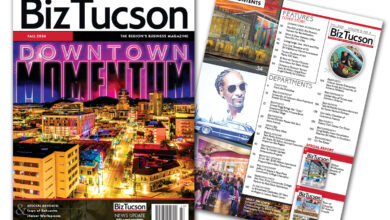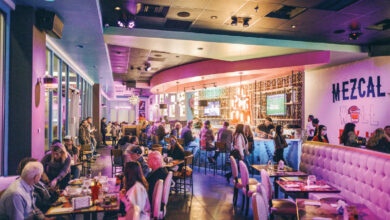
Winner of $250,000 Innovation Challenge Grant
By Jason Freedberg –
RBar Energy Thrives with Thryve
Winner of $250,000 Innovation Challenge Grant
Brian Cornelius is an entrepreneur who took a passion and built a business.
A native Tucsonan and former competitive cyclist, he was fed up with dry, artificially sweetened energy bars, and he believed that simple, tasty energy bars were missing from the shelves of grocery stores.
Cornelius developed his own recipes for all-natural energy bars that typically contain no more than a handful of ingredients. Distinguished by their moistness and cookie-like shape, the bars were a hit among his athletic friends, so in 2010 he started his own energy-bar business, RBar Energy.
By the summer of 2014 RBar Energy could count several successes including distribution in Whole Foods’ southern Pacific region, which covers southern California, Arizona, southern Nevada and Hawaii. The energy bars also had found space on shelves in major airports including Newark, LaGuardia and JFK. But Cornelius had hit a wall with funding and needed to figure out how to scale and grow his business.
In October 2014, RBar Energy applied to a 12-week scale-up accelerator program called Thryve Next, which is run by Startup Tucson, the local incubator that has been helping businesses primarily under a contract with the U.S. Small Business Administration and with funding from other private sources.
Programs like Thryve Next aim to help launch companies or push existing businesses to achieve higher levels of success. They typically offer mentorship and education, and facilitate the use of space and equipment.
“With everybody, we begin with start over,” said Justin Williams, CEO of Startup Tucson. “What is the purpose, the problem, the value? Sure you have $150,000 in sales this year – but that’s far from $1 million in sales, so let’s prove that you can get there.”
RBar Energy was accepted into the accelerator program and Cornelius began working with Williams in January 2015. In August, RBar Energy was awarded the Arizona Commerce Authority’s $250,000 Innovation Challenge Grant.
“We coached him during his interview process and presentations,” Williams said. “But I think most important was the work we were doing during the program, the curriculum piece, to get him to think about – What does it mean to scale? What is it going to take to get there?”
Coachability is significant to the criteria Thryve Next uses when interviewing prospective companies to accept into its programs.
“He is super coachable, which was important,” Williams said of Cornelius.
For Cornelius, polishing his communication skills with investors was a primary focus during his accelerator curriculum. With mentoring and coaching from Thryve Next, he was able to identify exactly what makes his bars unique.
“I knew we had something different, but Startup Tucson and the Arizona Innovation Challenge taught me exactly what is different about our product,” Cornelius said. “We do something that nobody else can because of modifications we made to a piece of equipment.”
“This intellectual property is defensible. We’re going to apply for a provisional patent on this manufacturing process,” Williams said. “At the end of the day, the biggest impact we had on them was to get them to think of themselves as a technology company.”
Instead of thinking of itself as a food company, Williams wanted RBar Energy to think of itself as a manufacturing company that happens to manufacture a food product.
“Even if you’re not, if you can start to adopt that mindset, communicate the way they do, use their language, you will appear bolder and have the orientation that gets you conversations you want to have,” Williams said.
Thryve Next is currently working with its fourth cohort, or group of companies, and since January 2015 alone has worked with 40 companies.
Startup Tucson and Thryve Next are conscious of what Williams calls “the whole ecosystem piece. How do we engage people who are thinking about it but aren’t talking about it? Or people who are talking but aren’t doing anything about it? Or help those who are doing something about it but aren’t doing it well.”
Tucson now has tools and programs available for entrepreneurs of any age or level of experience to optimize, grow and eventually scale their businesses.
Thryve Next currently runs three levels of business development programs. The first is an express program that lasts five weeks and is meant for early ideas. The next level is a startup incubator, and the third level is a scale-up accelerator, the program that helped Cornelius.
“There are different ways to learn, and we’re trying to create low barriers for entry into the programs and for the learning happening in our town,” Williams said.
Giving people the opportunity to think and be bold is central to the mission of Startup Tucson and Thryve Next, Williams said.
“Tucson is an amazing community to start a business, go through your R&D, hand out samples, because it is very tight knit here,” Cornelius said. “And now I’m discovering that it is actually a great place to grow and scale a business. The resources are right here.”





